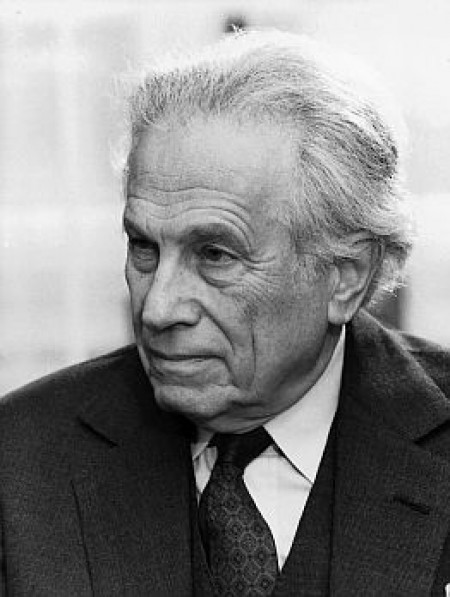9 April 1906, Budapest –15 November 1988, Zürich
The famous conductor, Antal Doráti, was born into a musician family: his father was a violinist in the orchestra of the Budapest Opera House. Doráti entered the Music Academy at the age of fourteen. He studied composition with Kodály, piano with Arnold Székely, and chamber music with Leo Weiner. Besides Kodály and Weiner, in those early years the greatest influence on him was Bartók, while his conductor ideal was Arturo Toscanini. At the age of eighteen he was already working as couch at the Budapest Opera House, and in the same year, 1924, had his debut there as conductor as well. After four years, however, he went abroad and had a great international career: by the 1960's he had become one of the most sought-after conductors in the world.
He began his international career at the Dresden Opera, where in 1928 he became Fritz Busch's assistant. From 1929 till 1933 he was musical director in Münster, and from 1935 was the conductor of the Ballets Russes in Monte Carlo. This was the successor to Diaghilev's legendary ensemble, at that time directed by Fokin. He toured America, Australia and New Zealand with the company. After the war, Doráti reorganised the Dallas Symphony Orchestra, then, from 1949 to 1960 was the leading conductor of the Minneapolis Symphony Orchestra, making the ensemble internationally known and recognised through their recordings. Between 1963 and 1967 he conducted the BBC Symphony Orchestra, from 1966 the Stockholm Philharmonic Orchestra, from 1971 for seven years the Washington National Symphony Orchestra, from 1977 the Detroit Symphony Orchestra, and from 1975 he was the leading conductor, later permanent conductor, of the London Royal Philharmonic Orchestra. From its establishment in 1957, he paid close attention to the activities of the Philharmonia Hungarica, an orchestra made up of Hungarian refugees, later becoming its honorary chairman. In 1970-73 he recorded with the orchestra all the Haydn symphonies.
"Antal Doráti has been regarded for decades as perhaps the most talented trainer of an orchestra in the world. We know of great conductors who have trained and have become one with a great symphony orchestra, and who perform on that orchestra as on an instrument. (…) But wherever, in America or in Europe, Doráti headed an orchestra for any length of time, he trained each and every one till they became internationally ranked symphonic ensembles (…) With us too, whenever he came here, he always brought with him the requirements, the measure and the atmosphere of the highest ranking professionalism, leaving, after his departure, a long-lasting impression on the musicians who had worked with him." (From a criticism by György Kroó, 1981)
Doráti often worked as a guest conductor with other great orchestras as well. At his 1946 British debut, for example, he conducted the London Symphony Orchestra, which led to a regular cooperation between them. From 1960 for ten years each season he conducted the Israel Philharmonic, also touring with them on several occasions. He frequently appeared as a guest conductor in the most important opera houses in Europe and America. Doráti is also among the musicians who made the most recordings in the world.
Apart from a break lasting twenty years, parallel with his career as a conductor, he also composed all his life. "Composing is a very fundamental part of my life", he wrote in his memoirs. "I regard myself not as a conductor who composes but as a composer who conducts." His most important works are The Way (dramatic cantata about the crossroad, to Paul Claudel's text), a Missa Brevis, a symphony in five movements, a piano concerto, a cello and an oboe concerto, two song cycles with orchestral accompaniment (Chamber music, to James Joyce's text, and The Voices, to poems by Rainer Maria Rilke).
J. P.



